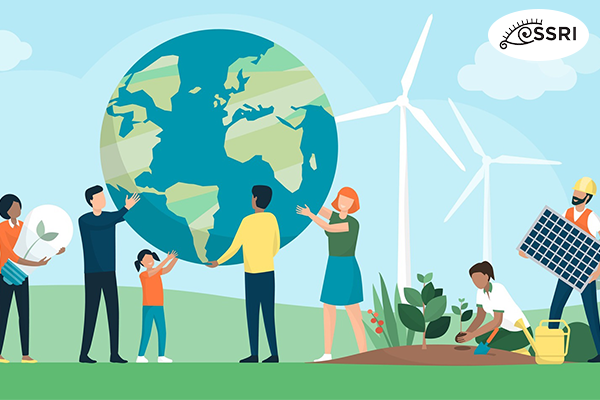Introduction:
Sustainability has emerged as one of the most pressing ethical concerns of our time, captivating the attention of individuals, businesses, and governments worldwide. As elucidated by Mason (2022), sustainability embodies the imperative to coexist harmoniously with the natural world, safeguarding it against degradation and depletion. In essence, it encapsulates the notion of thriving without compromising the health of our planet. One facet of sustainability that particularly resonates with me is the imperative to mitigate the impact of climate change.
The urgency of addressing climate change aligns seamlessly with my personal aspiration to champion environmental causes. It underscores my fervent desire to advocate for a more sustainable future. In embracing sustainability, I recognize not only a moral obligation but also a profound opportunity to contribute to the well-being of our planet and future generations.
Sustainability, as articulated by Mason (2022), is a multifaceted concept that transcends mere environmental preservation. It encompasses a holistic approach to existence, emphasizing the interconnectedness of human activities with the natural environment. At its core lies the recognition that our actions have repercussions, echoing across ecosystems and generations. Hence, sustainability implores us to adopt practices that nurture rather than deplete the resources upon which life depends.
Central to the ethos of sustainability is the imperative to mitigate climate change—the defining environmental challenge of our era. The consequences of unchecked climate change are far-reaching, spanning from rising sea levels and extreme weather events to biodiversity loss and food insecurity. As stewards of this planet, we bear a collective responsibility to curb our carbon footprint and embrace renewable energy sources.
For me, the call to address climate change resonates on a deeply personal level. It aligns with my intrinsic values and aspirations, fueling my commitment to environmental advocacy. By championing sustainability, I strive to amplify awareness, galvanize action, and effect positive change within my sphere of influence.
Moreover, the pursuit of sustainability transcends individual endeavors; it necessitates collective action and systemic change. Governments, businesses, and communities play pivotal roles in shaping policies, fostering innovation, and cultivating sustainable practices. Collaboration across sectors is indispensable in charting a course towards a more resilient and equitable future.
In essence, sustainability embodies an ethical imperative—a moral compass guiding us towards responsible stewardship of our planet. It beckons us to embrace innovation, challenge the status quo, and forge pathways towards a more sustainable existence. By heeding this call, we not only safeguard the integrity of our environment but also uphold the dignity and well-being of all life on Earth, ensuring a legacy of sustainability for generations to come.
Embracing Sustainability: Preserving Nature for Future Generations
Sustainability stands as a contemporary ethos, urging us to live in symbiosis with nature while ensuring the well-being of future generations. Defined by Mason (2022) as the pursuit of our needs without compromising the ability of posterity to meet their own, sustainability embodies a profound responsibility to steward the environment and safeguard its vitality.
At its essence, sustainability necessitates a paradigm shift in our relationship with the natural world. It calls for a recalibration of our actions to ensure they are in harmony with the delicate balance of ecosystems. By adopting sustainable practices, we endeavor to perpetuate the abundance of nature, rather than deplete it for short-term gain.
The imperative of sustainability extends beyond mere ecological preservation; it encompasses the ethical imperative to secure the essentials of life for present and future generations. Air, water, and food emerge as quintessential pillars of human sustenance, each indispensable to our survival and well-being.
Water, a fundamental element of life, is indispensable for human existence. However, the pervasion of pollutants threatens its purity, endangering both human health and ecosystem integrity. Similarly, the availability of clean air is essential for respiratory health and overall vitality. Pollution diminishes the quality of the air we breathe, imperiling our well-being and that of the planet.
Furthermore, sustenance hinges on access to nutritious food, the cornerstone of human survival. Yet, unsustainable agricultural practices, coupled with environmental degradation, jeopardize food security and exacerbate global hunger. As stewards of the Earth, it is incumbent upon us to nurture the land and its bounty, ensuring equitable access to nourishment for all.
In essence, sustainability is an imperative for our collective survival and flourishing. It compels us to recognize the interconnectedness of all life and embrace practices that honor the sanctity of nature. By cultivating a harmonious relationship with the environment and prioritizing the needs of future generations, we forge a path towards a more resilient and equitable world. Embracing sustainability is not merely a choice; it is a moral imperative, guiding us towards a future where humanity and nature thrive in harmony..
Nurturing Sustainability: My Personal Journey in Mitigating Climate Change
Introduction:
Sustainability isn’t just a buzzword; it’s a profound commitment to addressing the impacts of climate change. Rooted in the United Nations Sustainable Development Goal 13, this endeavor goes beyond environmental preservation—it’s about securing the very essence of our existence. Through a holistic approach spanning individual actions and global initiatives, I aim to contribute to a more sustainable future for generations to come.
Mitigating climate change forms the core of my sustainability ethos. It involves a multifaceted strategy, from reducing greenhouse gas emissions to transitioning to renewable energy and protecting vulnerable ecosystems. By embracing climate change mitigation, we strive to counteract the adverse effects of global warming and safeguard both human well-being and the planet’s health.
The urgency of addressing climate change is evident in its wide-ranging consequences, from exacerbating extreme weather events to jeopardizing food security and public health. Through sustainable practices at all levels—individual, community, organizational, and governmental—we can collectively mitigate these impacts and enhance resilience against climate-related challenges.
At the heart of the sustainability narrative lies the understanding that each individual plays a vital role in driving change. Whether it’s reducing carbon footprints, advocating for sustainable policies, or fostering community resilience, every action contributes to the broader goal of sustainability. Moreover, by integrating sustainability principles into our daily lives, we inspire others to follow suit, sparking a ripple effect of positive change.
My personal journey toward sustainability is deeply rooted in my desire to become an environmental steward. Motivated by childhood experiences witnessing the consequences of climate change, I resolved to dedicate myself to environmental protection and climate advocacy. This pivotal moment ignited a passion for learning about climate change mitigation strategies and actively engaging in efforts to minimize its impacts.
Through education, advocacy, and grassroots initiatives, I strive to empower myself and others to make sustainable choices that benefit present and future generations. From reducing waste and pollution to promoting renewable energy adoption, I endeavor to embody sustainability principles in all aspects of my life.
In essence, my commitment to mitigating climate change is more than a personal endeavor; it’s a testament to my unwavering dedication to fostering a more just, equitable, and sustainable world. As I continue this journey, I’m driven by the belief that together, we can effect meaningful change and ensure a brighter future for our planet and all its inhabitants.
Forging Connections: Embracing Active Hope in Climate Change Mitigation
Amidst a myriad of sustainability principles and goals, I find a profound resonance with the imperative of reducing the impact of climate change. Rooted in the Earth Charter and Sustainable Development Goals, this concept embodies a clarion call to action, compelling us to confront the looming threat of climate change head-on. As I delve deeper into this pivotal issue, I am struck by its interconnectedness with the broader ethos of sustainability and the imperative of fostering active hope in the face of adversity.
Climate change emerges as the foremost adversary to sustainability, casting a long shadow over our collective future. Its insidious effects, from rising temperatures to erratic weather patterns, reverberate across the globe, imperiling ecosystems, livelihoods, and human well-being. By recognizing the existential threat posed by climate change, we awaken to the urgent need for concerted action to mitigate its impacts and forge a path towards a more sustainable future.
At the heart of the climate change mitigation paradigm lies the principle of active hope—a steadfast belief in our capacity to effect positive change through collective action and determination. While the magnitude of the challenge may seem daunting, active hope imbues us with the resilience and resolve to confront adversity and chart a course towards a more sustainable and equitable world.
The importance of reducing the impact of climate change extends far beyond mere environmental preservation. It is a moral imperative, rooted in compassion and solidarity, to alleviate the suffering of those most vulnerable to the ravages of climate change. From marginalized communities facing displacement due to sea-level rise to farmers grappling with drought and crop failure, the human toll of climate change underscores the urgency of our response.
Moreover, achieving anticipated sustainability hinges upon our ability to effectively address climate change. As long as the specter of climate change looms large, our aspirations for a sustainable future remain elusive. Thus, the imperative to reduce the impact of climate change serves as a rallying cry for collective action and transformative change.
Embracing this concept requires a fundamental shift in mindset—a recognition of our interconnectedness with the natural world and our responsibility to steward it for future generations. It calls upon us to make informed choices, advocate for sustainable policies, and support initiatives that mitigate greenhouse gas emissions and build resilience against climate-related hazards.
In essence, reducing the impact of climate change embodies not only a pragmatic necessity but also a profound act of hope and solidarity. By embracing active hope and mobilizing collective action, we can transcend the challenges posed by climate change and pave the way for a more sustainable, resilient, and equitable future for all.
Embracing the Great Turning: Catalyzing Change for a Sustainable Future
In the quest for sustainability, the concept of the Great Turning offers a transformative lens through which to navigate the complexities of our modern world. Rooted in the works of Macy and Johnstone (2012), the Great Turning heralds a paradigm shift of unprecedented magnitude—a revolution aimed at achieving ecological balance and sustainability. By integrating this framework into our daily lives, we can cultivate a deeper understanding of our interconnectedness with the natural world and mobilize collective action to address pressing environmental challenges.
The Great Turning beckons us to embrace a revolutionary ethos—one that transcends the status quo and charts a course towards a more sustainable future. At its core lies the imperative to adopt climate change mitigation strategies, as advocated by Macy and Johnstone (2012). This entails a fundamental shift in mindset and behavior, heralding a departure from unsustainable practices towards a new order of sustainable living.
Central to the Great Turning is the concept of Seeing with New Eyes—a profound recognition of our place within the intricate tapestry of life. As Macy and Johnstone (2012) elucidate, this perspective invites us to acknowledge our ancestral heritage and our role as custodians of the Earth. By viewing ourselves as integral components of a broader ecological continuum, we are empowered to take meaningful action to safeguard the planet for future generations.
Moreover, the notion of Going Forth offers practical guidance on how we can contribute to healing the world. It underscores the importance of cultivating dreams and visions for the future, serving as beacons of hope amidst environmental uncertainty. Through initiatives aimed at reducing the impact of climate change, we can harness the transformative power of collective action and pave the way for a more sustainable and resilient world.
In conclusion, sustainability emerges as an imperative for safeguarding the integrity of our planet and ensuring a thriving future for all. By embracing the principles of the Great Turning and actively engaging in climate change mitigation efforts, we can catalyze a sustainable revolution that transcends individual actions and inspires collective change. As stewards of the Earth, it is incumbent upon us to heed the call of sustainability and forge a path towards a brighter, more equitable future for generations to come.
Author Bio – Emily Aurora
Meet Emily, a dedicated scholar pursuing her Master’s degree in Environmental Studies with a specialization in Sustainability. With a passion for environmental conservation and a keen interest in addressing global challenges, Emily has immersed herself in the study of sustainability, delving deep into topics such as climate change mitigation, resource management, and sustainable development.
Driven by a desire to make a meaningful impact on the world, Emily’s academic journey has been shaped by a commitment to understanding the intricate interplay between human activities and the natural environment. Through her coursework, research projects, and fieldwork experiences, she has gained valuable insights into the complexities of sustainability and the ethical considerations inherent in environmental decision-making.
As a specialist in sustainability, Emily brings a wealth of knowledge and expertise to her work. Whether analyzing policy frameworks, conducting environmental assessments, or advocating for sustainable practices, she approaches each challenge with a blend of analytical rigor and compassionate concern for the well-being of people and the planet.
Beyond her academic pursuits, Emily is actively engaged in her community, volunteering her time and expertise to local environmental initiatives and grassroots organizations. Through her advocacy efforts and outreach activities, she strives to raise awareness about sustainability issues and inspire others to take action towards creating a more sustainable future.
With a Master’s degree in Environmental Studies and a specialization in Sustainability on the horizon, Emily is poised to embark on a career dedicated to advancing environmental stewardship and promoting sustainability in all its forms. Armed with knowledge, passion, and a deep sense of purpose, she is ready to contribute her skills and expertise to tackling the most pressing challenges facing our world today.
References
- Ahmed, N., Thompson, S., & Glaser, M. (2019). Global aquaculture productivity, environmental sustainability, and climate change adaptability. Environmental Management, 63(2), 159-172.
- Macy, J., & Johnstone, C. (2012). Active hope: How to face the mess we’re in without going crazy. New World Library.
- Mason, M. (2022). What is sustainability and why is it important? Environmental Science.
- United Nations. (2021). Climate change: Sustainable development knowledge platform.




